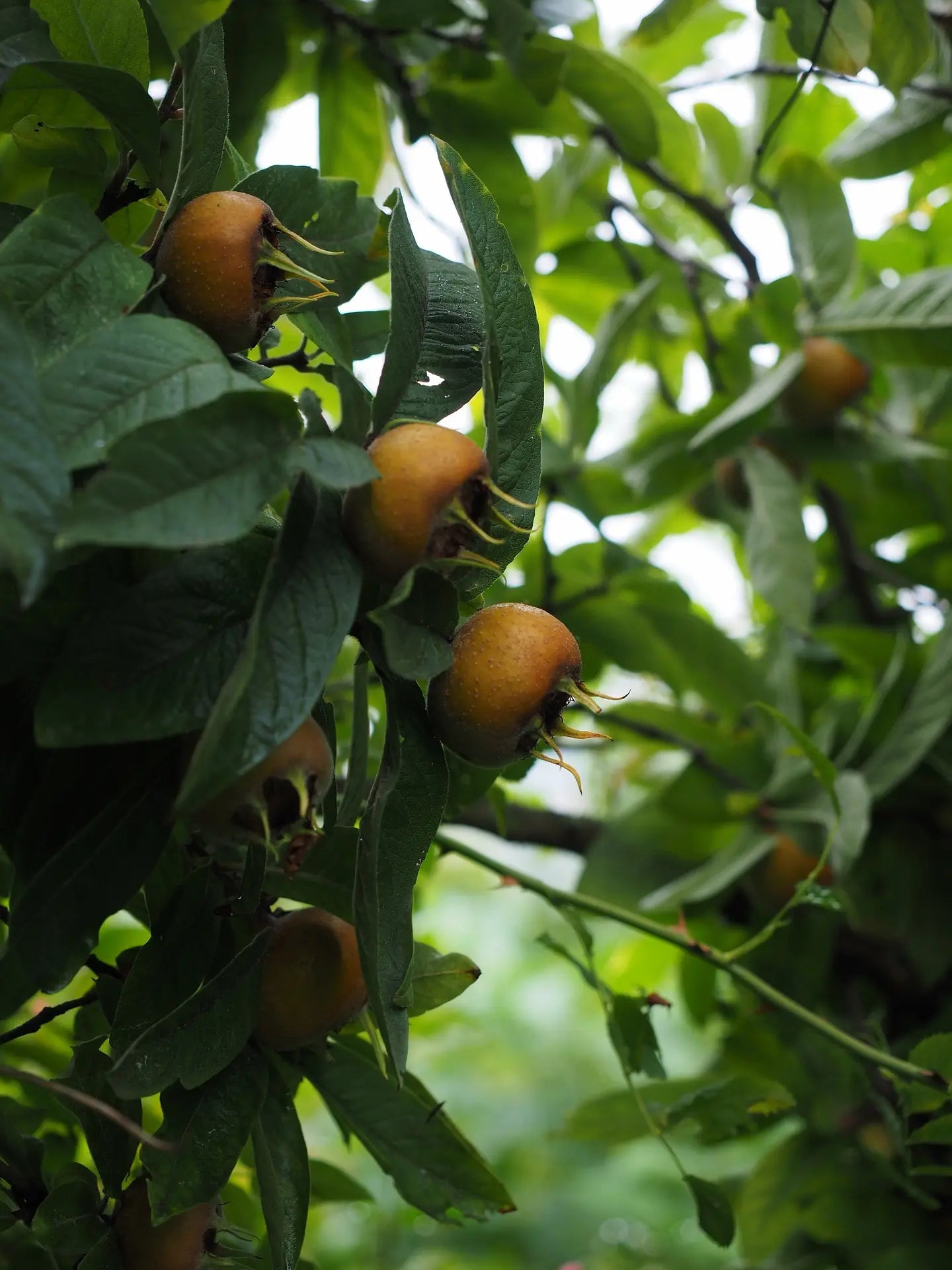-
Delivery from 10 plants to France, Switzerland and Europe
Delivery method -
Fruit Tree Wholesale Supplier
About Us -
Quality Fruit Tree Plants
Technical itinerary
Apyrena Medlar Half-Standard Tree 6-8 cm diameter bare-root
Apyrena Medlar Half-Standard Tree 6-8 cm diameter bare-root
The prices shown are our base prices for large volumes. Depending on the quantity ordered and the producers’ pricing scales, the rate may be adjusted upward. Each quote is personalized to ensure you receive a fair price.
Mini order 10 units / Multiple orders 10 units (FRS202412002)
Couldn't load pickup availability
 Buy now and get it delivered when you're ready to plant - Add your desired date to your quote request
Buy now and get it delivered when you're ready to plant - Add your desired date to your quote request
- Delivery from 10 plants to France, Switzerland and Europe

Technical sheet of the Apyrena medlar variety
- Fruit flesh color: Generally brown
- Size and shape: Generally medium in size. Fruits are globose and pear-shaped.
- Tree Size: Reaches a height of 1.5 m to 2 m
- Fruit maturity: Later than other medlars. Best eaten after reaching a stage of extreme ripeness (overripe).
- Fruit taste: The flesh is quite acidic and tart, reminiscent of applesauce
- Earliness of the variety: Medium early. Ripens about 20 days earlier than the 'Algerie' variety.
- Fruiting period: Generally between the 3rd and 5th year after planting. Harvest in October-November after the first frosts.
- Disease resistance and storage: Can be grown in all soil types. Fruits have a long shelf life.
- Variety Yield: A mature medlar tree can produce up to 90 kg of fruit per year
- Is this variety self-fertile? Probably self-fertile, like most medlar trees.
- Commercial use: Compotes, syrups and drinks
- Comments: May require staking to prevent the tree from moving and to facilitate its recovery. Can be grown all along the Mediterranean coast and can survive even in the Paris region, but it is only productive in a mild and warm climate, such as that of the PACA region.
Quick read / the essentials on the Medlar Apyrena
The Medlar Apyrena is a hardy variety of Mespilus germanica , renowned for its ease of cultivation, disease resistance and the quality of its fruit after ripening. Its adaptability to temperate and cold climates makes it an ideal variety for professional apple growers and producers in France . Thanks to its low maintenance and consistent productivity, it represents an excellent option for orchards wishing to diversify their fruit offering with a traditional and sought-after species.
If you want to buy Apyrena medlar plants , it is recommended to buy from a specialist medlar plant wholesaler to ensure healthy plants adapted to the soil and climate conditions of your farm. With a moderate adult height (1.5 to 2 meters), this compact tree fits well in professional orchards as well as in small diversified plantations .
The fruits of the Medlar Apyrena are medium-sized, globose to slightly pear-shaped, with a reddish-brown skin when ripe. Their flesh, initially astringent, becomes tender and sweet after ripening, developing aromas reminiscent of applesauce. They are particularly appreciated in jams, jellies, compotes and fermented drinks . Harvest takes place in October, but the fruits must be allowed to ripen to reveal their full flavor.
This tree tolerates drought well , adapts to calcareous and stony soils , but prefers deep, well-drained soils . It can withstand temperatures down to -23°C , making it ideal for Mediterranean and continental climates . Regular watering is recommended in the first few years to ensure good establishment.
To optimize productivity, it is advisable to use suitable rootstocks:
- Quince BA29 : for rapid fruiting and adaptation to fertile soils.
- Medlar franc : for better longevity and increased resistance to drought.
Producers wishing to purchase Apyrena medlar plants should choose a specialist medlar plant wholesale supplier , guaranteeing robust and high-performing plants for long-lasting and profitable cultivation.
Presentation of the Medlar Apyrena
The Apyrena medlar is a variety of Mespilus germanica particularly appreciated for its hardiness and its ability to adapt to the different French climatic conditions. It is distinguished by its tasty fruits and regular production, which makes it an ideal choice for apple and medlar growers.
Origin and History
The medlar tree originates from Asia Minor, corresponding to present-day Turkey, where it was cultivated as early as 1000 BC. Its introduction into Europe is attributed to the Romans, and it was recommended by Charlemagne in the capitulary De Villis , which testifies to its historical importance in European arboriculture.
Tree Characteristics
The Apyrena medlar is a moderately growing tree that reaches a mature height of 1.5 to 2 meters. It forms an elegant shape, with twisted branches and deciduous foliage offering beautiful autumn colors. Its flowering, generally in April-May, attracts pollinators and is relatively resistant to late frosts.
Qualities of Fruits
The fruits of the Medlar Apyrena are medium-sized, globose to slightly pear-shaped, with a pubescent skin that turns from dark green to reddish-brown when ripe. Their brown flesh, tangy and slightly bitter before stale, becomes tender and sweet once fully ripe. Harvesting generally takes place in October, and the fruits must be allowed to stale to reveal their full flavor. They are particularly suitable for processing into compotes, jellies, syrups, and fermented drinks.
Growing Conditions
The Apyrena medlar is a hardy tree, capable of withstanding temperatures as low as -18°C to -23°C, allowing it to adapt to a wide variety of climates, whether Mediterranean or continental. It tolerates drought once well established and grows in all types of soil, although it prefers well-drained, deep, and loose soil. It tolerates stony soils relatively well but can suffer in saline, overly dry, or compacted soil. A sunny exposure is recommended to optimize fruiting.
Watering is necessary during the first few years to promote good establishment, then limited to periods of drought. Gentle pruning is recommended to maintain good tree balance and stimulate fruit production.
Pollination and Productivity
Although available sources do not explicitly state whether the Apyrena medlar is self-fertile, most medlar trees are, meaning they do not require another tree to ensure their fruiting. However, the presence of other medlar trees can promote even more abundant production.
A mature tree can produce up to 90 kg of fruit per year, although this yield depends on growing conditions and the age of the tree.
Resistance to Diseases and Parasites
The Apyrena medlar is generally disease resistant and requires few phytosanitary treatments, which makes it an interesting variety for organic farming. However, it can be subject to attacks by aphids or scale insects, and in certain conditions, to fire blight ( Erwinia amylovora ). Good management of foliage ventilation and regular pruning can limit these risks.
Uses and Valorization of Fruits
Medlars from the Medlar Tree Apyrena lend themselves to many artisanal and industrial preparations. They are particularly appreciated in jams, jellies and compotes, and can be transformed into syrup or lightly alcoholic drinks. The flesh, once overripe, is reminiscent of applesauce and has tonic and digestive properties.
Recommendations for Producers
The Apyrena medlar represents an interesting opportunity for producers looking for a hardy, productive variety well-adapted to French climatic conditions. Its low maintenance, disease resistance, and processing potential make it a profitable and sustainable crop.
Fruit growers looking to maximize their production should prioritize well-drained soils and ensure adequate watering during dry periods. Harvests can be maximized by allowing fruit to ripen on straw to improve their flavor.
Commercial Valuation
For nurseries and fruit tree plant sales sites, several arguments can be put forward to promote this variety:
- Highlighting its history and rusticity , emphasizing its ancient origins and its adaptation to French climates.
- Taste and culinary qualities , explaining the different ways of consuming and processing medlars.
- Ease of cultivation and low maintenance , including disease resistance and drought tolerance.
- Probable self-fertility , which simplifies its cultivation for individuals and professionals.
The Apyrena Medlar is therefore an ideal variety for apple growers and producers wishing to diversify their offering with an ancient fruit, appreciated for its unique flavor and its numerous uses.
To summarize: Medlar Apyrena
The Apyrena medlar is an old and rustic variety , particularly adapted to French climatic conditions. With its moderate growth and low maintenance , it is a strategic choice for producers looking for a profitable and low-maintenance crop . It is a self-fertile variety, which means that it fruits without requiring the presence of another tree, although the proximity of other medlar trees can improve the yield.
If you are looking to buy Apyrena medlar plants , it is essential to choose a specialist medlar plant wholesaler to ensure high-quality plants. This medlar tree produces tasty fruits, harvested in October and intended for consumption after bletting .
Thanks to its disease resistance , this tree is suitable for organic cultivation and requires few phytosanitary treatments. It is however sensitive to aphids and scale insects , but good aeration of the foliage and regular pruning can limit their impact.
Medlars from the Medlarier Apyrena are particularly valued in:
- Artisanal processing (jams, jellies, syrups, fermented drinks).
- Local consumption and short supply chains , due to the growing demand for old fruits.
- Organic farming , thanks to its low treatment requirements.
With a yield of up to 90 kg of fruit per tree , the Apyrena Medlar tree is an attractive investment for producers looking to diversify their production . Thanks to its ancient history, its robustness and its unique taste qualities , it represents a safe bet for French apple growers.
In conclusion, for reliable and efficient production, it is essential to buy Apyrena medlar plants from a specialist medlar plant wholesale supplier , guaranteeing plants adapted to market requirements and growing conditions in France.
-
Apyrena Medlar Scion bare-root organic
Regular price €14,90 EURRegular priceUnit price / per -
Apyrena Medlar Half-Standard Tree 8-10 cm diameter bare-root
Regular price €23,00 EURRegular priceUnit price / per -
Apyrena Medlar Half-Standard Tree 6-8 cm diameter bare-root
Regular price €22,20 EURRegular priceUnit price / per -
Apyrena Medlar Half-Standard Tree 10-12 cm diameter bare-root
Regular price €26,00 EURRegular priceUnit price / per



